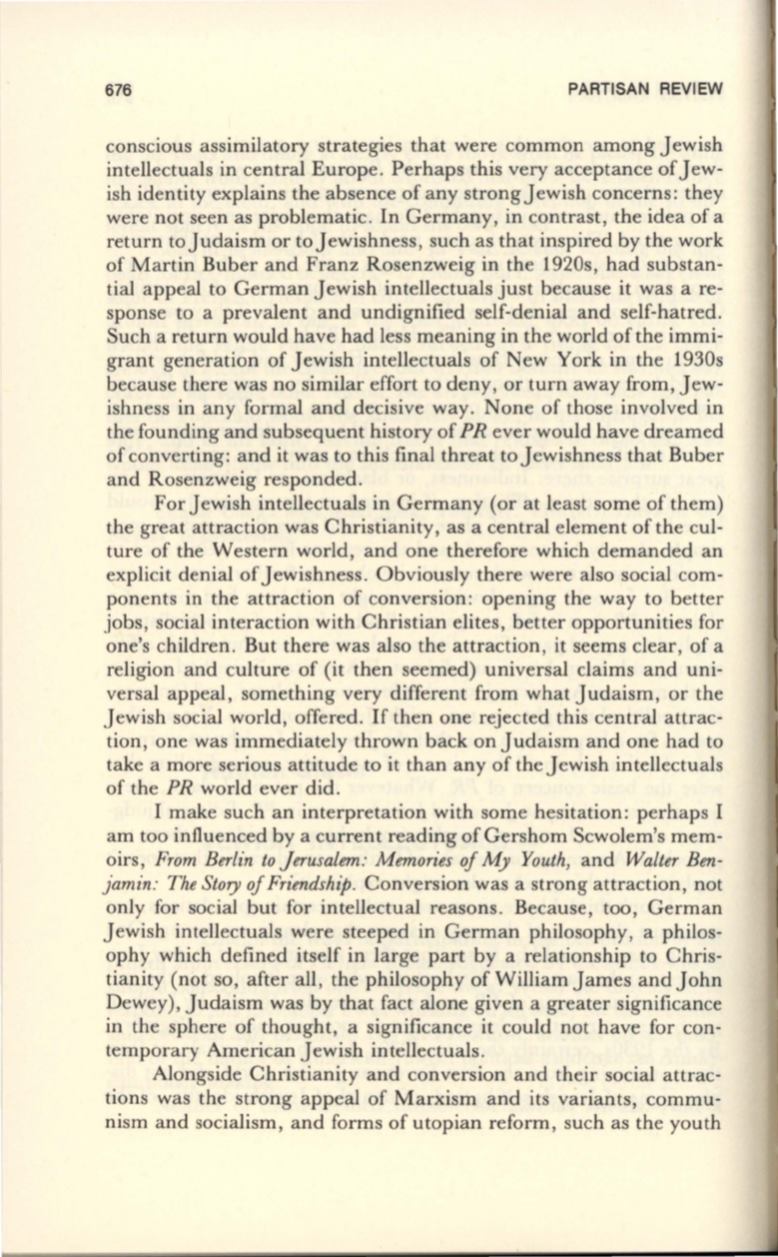
676
PARTISAN REVIEW
conscious assimilatory strategies that were common among Jewish
intellectuals in central Europe. Perhaps this very acceptance ofJew–
ish identity explains the absence of any strong Jewish concerns : they
were not seen as problematic . In Germany, in contrast , the idea of a
return to Judaism or to
J
ewishness, such as that inspired by the work
of Martin Buber and Franz Rosenzweig in the 1920s, had substan–
tial appeal to German Jewish intellectuals just because it was a re–
sponse to a prevalent and undignified self-denial and self-hatred .
Such a return would have had less meaning in the world of the immi–
grant generation of Jewish intellectuals of New York in the 1930s
because there was no similar effort to deny, or turn away from , Jew–
ishness in any formal and decisive way. None of those involved in
the founding and subsequent history of
PR
ever would have dreamed
of converting: and it was to this final threat to
J
ewishness that Buber
and Rosenzweig responded.
For Jewish intellectuals in Germany (or at least some of them)
the great attraction was Christianity, as a central element of the cul–
ture of the Western world, and one therefore which demanded an
explicit denial of Jewishness. Obviously there were also social com–
ponents in the attraction of conversion: opening the way to better
jobs, social interaction with Christian elites, better opportunities for
one's children. But there was also the attraction , it seems clear , of a
religion and culture of (it then seemed) universal claims and uni–
versal appeal , something very different from what Judaism , or the
Jewish social world, offered. If then one rejected this central attrac–
tion, one was immediately thrown back on Judaism and one had to
take a more serious attitude to it than any of the Jewish intellectuals
of the
PR
world ever did.
I make such an interpretation with some hesitation: perhaps I
am too influenced by a current reading of Gershom Scwolem's mem–
oirs,
From Berlin to Jerusalem: Memories of My Youth,
and
Walter Ben–
jamin: The Story of Friendship.
Conversion was a strong attraction , not
only for social but for intellectual reasons . Because, too, German
Jewish intellectuals were steeped in German philosophy, a philos–
ophy which defined itself in large part by a relationship to Chris–
tianity (not so, after all , the philosophy of William James and John
Dewey), Judaism was by that fact alone given a greater significance
in the sphere of thought, a significance it could not have for con–
temporary American Jewish intellectuals .
Alongside Christianity and conversion and their social attrac–
tions was the strong appeal of Marxism and its variants, commu–
nism and socialism, and forms of utopian reform, such as the youth


